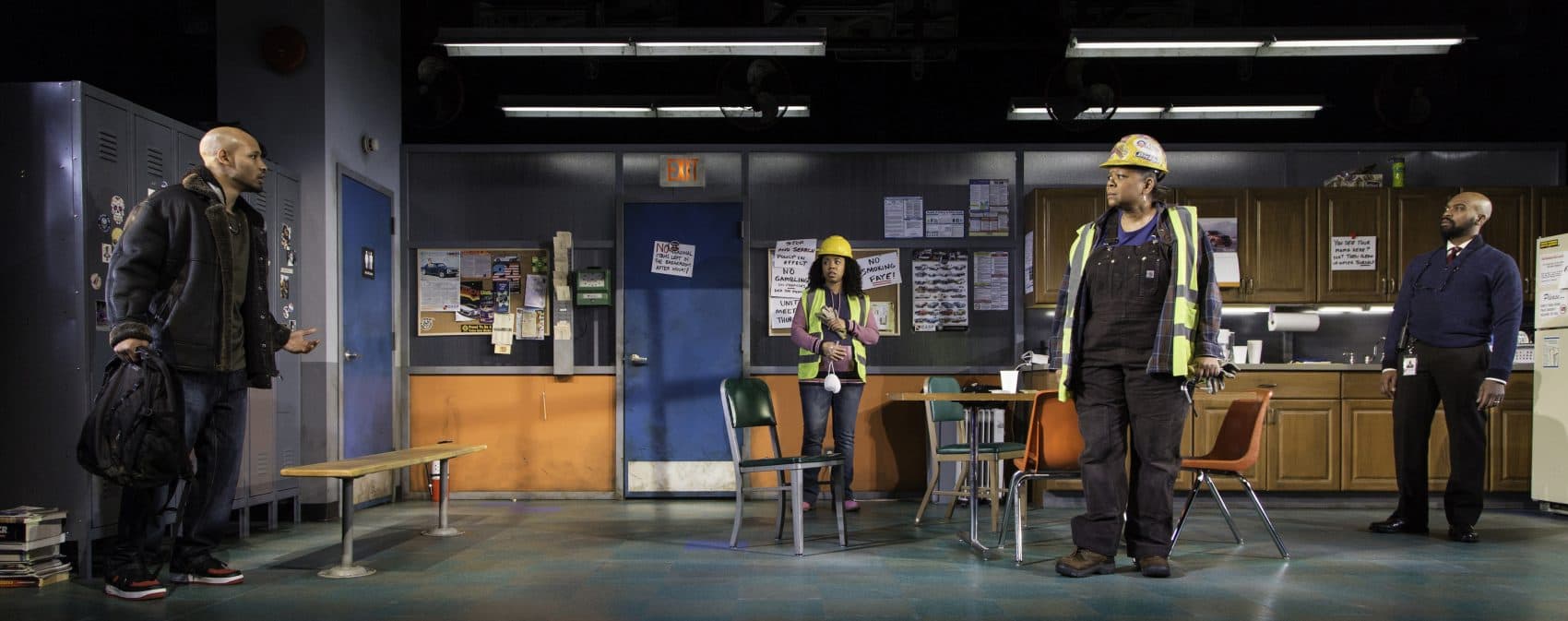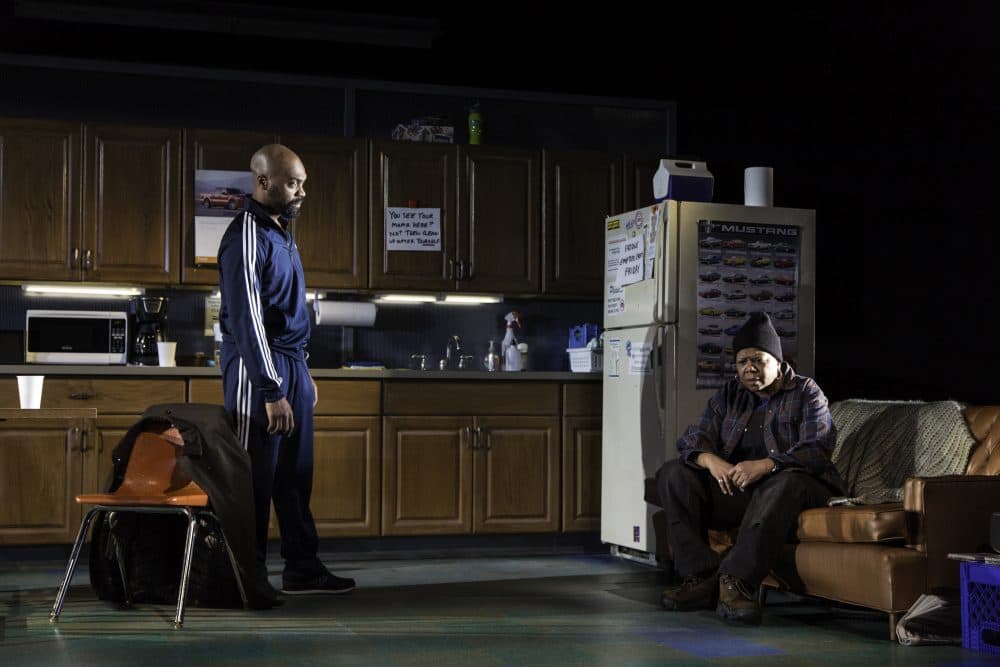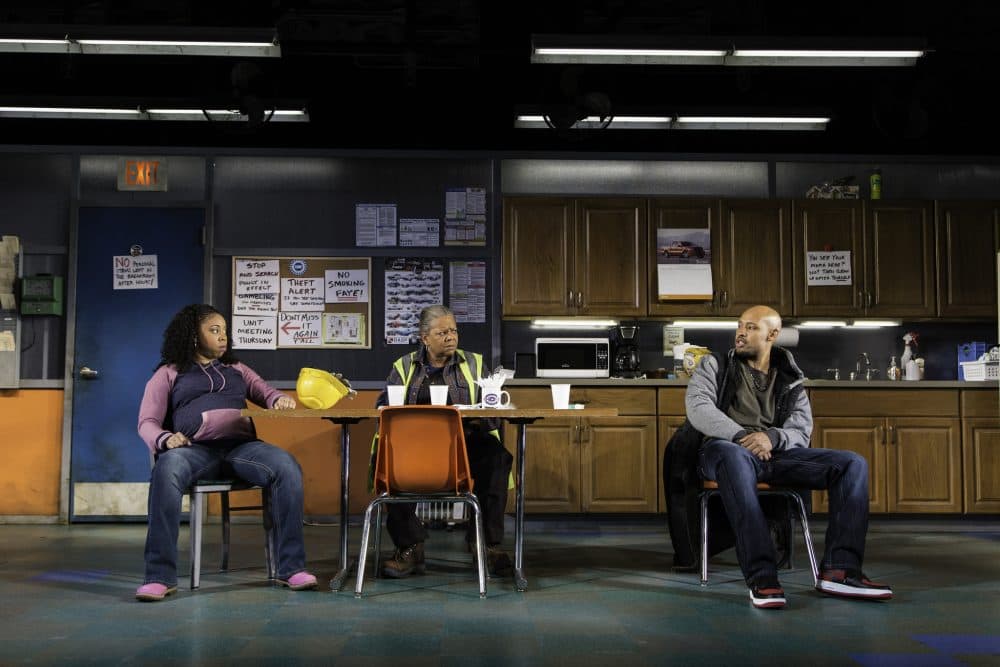Advertisement
Review
Huntington Theatre Company Fills Out Its 'Skeleton Crew' With Power And Grace

The program for Huntington Theatre Company’s production of Dominique Morisseau’s “Skeleton Crew” (running through March 31 at the Boston Center for the Arts) takes note of an intriguing tidbit: This season, it’s the third most-produced play in the country. That’s not bad for a play that was developed in 2014 and saw its world premiere in 2016.
It’s easy to see why this particular work has gained traction. It’s a powerful, gracefully written play about working people and the issues they face (such as the need for strong unions to represent them). First and foremost, however, it’s about family at home, and family at work — and each person’s need to balance their commitments to both.

The four characters in “Skeleton Crew” represent a workplace family for a cadre of employees at a Detroit automobile manufacturing plant. The tough, self-sufficient Faye (Patricia R. Floyd) is their matriarch. She’s also their union rep, so when the foreman, Reggie (Maurice Emmanuel Parent) — for whom Faye really is like a mother — comes to her with news of the plant’s impending closure, Faye’s concern isn’t just for her own soft landing. She’s ready to launch into battle for the protection of everyone else on the floor, including the obstinate young Dez (Jonathan Louis Dent) and the pregnant, hard-working Shanita (Toccarra Cash). Sounding the alarm to her coworkers will imperil Reggie, however, who has chosen personal loyalty over the corporate hierarchy and shared this information improperly — which means that Faye, in turn, has to weigh competing bonds and their respective valences.
This dilemma is but one of many sources of tension in Morisseau’s intricately layered work. Another is the clash between Dez’s hot-blooded, youthful drive and the company strictures at which he chafes, but within which he needs to function if he hopes to earn the money to get his own business up and running. But Dez has another reason for sticking around, and that’s Shanita: He brings her coffee, he escorts her to her car every night after work and he signals his interest in every verbal exchange. She, in turn, puts him down and dismisses him. It’s a mating dance that thrills them both, and the fact that Shanita refuses to discuss her unborn child’s paternity only sharpens the edges of their growing attraction.

Morisseau is deft with the play’s politics, creating situations that parallel concerns in society at large. When a series of thefts at the plant increases both scrutiny and pressure from the company’s upper echelons, Reggie — already trying to hold the place together with spit, baling wire, and endless hand-written placards with legends like “THEFT ALERT,” “NO GAMBLING,” and “STOP AND SEARCH POLICY IN EFFECT” — is forced to play the heavy. Dez responds to a de facto stop and frisk with the wounded pride of a young man who feels unfairly targeted — though the contents of his backpack aren’t exactly in line with the rules. Both men share the same outrage: a fear that their agency, which they regard as their very manhood, is being taken from them — but because their roles are so different, their responses take opposing forms.
Gender politics reverberate throughout. It’s no accident that the mother-to-be Shanita is the one most in love with the process of manufacturing. Production is, for her, fulfillment. Faye — a veteran mother estranged from her pious son because she’s openly lesbian — is near the end of her working life, just trying to hold on until she hits the golden 30-year mark. Production isn’t her chief concern; peacekeeping is. If the factory must close, she’s on hand to guide management and labor alike to an amicable, equitable ending place.
Morisseau has said that she would like her Detroit plays (of which “Skeleton Crew” is the third) to do for her home city what August Wilson’s famed cycle did for Pittsburgh. But in focusing on Detroit’s stories, the playwright is also telling a story of America as a whole. The dire straits of America’s working men and women hover in the background here, implicit in the jury-rigged heating system for the employee breakroom (a grittily realistic, gloriously detailed set by Wilson Chin), the production’s costuming (by Ari Fulton) and the moody lighting design (by Adam Honoré). At the same time there’s an undercurrent of bravado that comes through in the way scenic elements suggest forward movement, the pride of progress and achievement. The sound design (by Nathan Leigh) fills that brief, too, with some muscular, energetic musical choices.

The strong cast, directed by Megan Sandberg-Zakian, is the heart and soul of this production, though, and each actor lands precisely on moment after standout moment. As of press night, the individual performances felt a little like islands that had yet to cohere into a completely unified greater whole; already, however, there was a sense that before long they would, and here, as in many other respects of this production, the sum would be greater than the parts.
“Skeleton Crew” continues through March 31 at the Calderwood Pavilion at the Boston Center for the Arts.